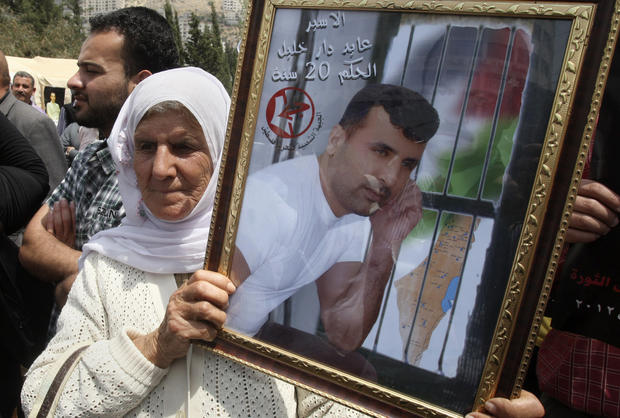IN THE MEDIA
Striking prisoners are no Gandhi-esque resisters
May 22, 2012 | Daniel Meyerowitz-Katz

Daniel Meyerowitz-Katz
ABC online – The Drum
22 May 2012
Before the deal that ended it last week, the recent Palestinian prisoners’ hunger strike in Israeli prisons was being presented as some kind of grand, Gandhi-esque “resistance” movement, pitting peaceful Palestinian “political prisoners” against cruel Israelis. This is certainly the impression that Randa Abdel-Fattah attempted to give in her recent piece on the subject.
As with many claims in the sadly still-unresolved Arab-Israel conflict, this general narrative is little more than a propaganda exercise, aimed at winning undeserved sympathy for people who are far from innocent.
The organisers of the strike include such “peaceful activists” as senior Hamas operatives Abbas a-Sayyid and Muhanned Sharrim, serving 35 and 29 life sentences respectively for their roles in the 2002 “Passover bombings”, in which 30 civilians were murdered and another 140 were injured as they sat down to Passover dinner in a Netanya hotel.
Another is Wajdi Joda, a senior operative for the ‘Democratic Front for the Liberation of Palestine’ who helped coordinate a suicide attack at a bus stop in 2003, killing four and injuring 15.
In fact, of the 1,600-odd prisoners in the strike, approximately 750 prisoners are aligned with Hamas and about 250 with Palestinian Islamic Jihad (PIJ) – both proscribed terrorist organisations in Australia.
Taher Halahleh and Bilal Diab, the two men whose “immediate risk of death” Abdel-Fatah laments, are both publicly identified as operatives in PIJ – an organisation with no functions beyond launching violent attacks on Israeli civilians.
All of the prisoners involved are in jail for proven or suspected involvement in terrorist activities and most have been directly implicated in the killing of innocent civilians, many of them during the ‘Second Intifada’ – a vicious campaign of terrorism in the first half of the last decade which led to the deaths of 1,200 Israelis and around 4,000 Palestinians.
Israel’s legal, military and political efforts in response have been almost completely successful – and thus have prevented the needless deaths of both Israelis and Palestinians.
It is true that some privileges for prisoners were revoked last year – such as access to university-level degrees and the ability to buy chicken, meat and vegetable dishes outside of regular prison meals. However, Israel still goes above and beyond its international obligations regarding its treatment of prisoners.
Prisoners are given every entitlement under international law and also such additional privileges as a canteen to purchase food items, regular access to newspapers and numerous television channels, and the ability to keep personal books and electronic items. Red Cross inspections, meetings with lawyers, and visits with parliamentary representatives are also routine and guaranteed.
All are afforded high-quality healthcare, as can be seen by the care provided even to those on hunger strike.
While the strikers claim that the policy of administrative detention was their target, according to the Israeli government, only six of the striking prisoners were actually held under this policy. Most reports have cited the overblown figure of 300 provided by anti-Israel NGOs – which is actually the total number of prisoners held under administrative detention, not the number who participated in the hunger strike.
Contrary to Abdel-Fatah’s claims, administrative detention is legal for the purposes that Israel uses it for – to prevent terrorist activities. Many countries around the world, including Australia, permit the detention without charge of individuals implicated in impending terrorist attacks, so long as there is some form of judicial oversight.
It is false to claim that prisoners under administrative detention are afforded no due process whatsoever. Administrative detention is only employed where there is specific information that an individual is about to engage in an attack and the only way to avert the attack is to detain them.
As Israeli judge Shimon Ashuel wrote in a recent judicial review of one of the more high-profile cases, “My impression is that administrative detention is the only available tool to negate the danger the detainee poses.”
No individual can be detained without the approval of a judge, who has reviewed all the evidence, and detention is subject to judicial review every six months. Prisoners are always informed why they are being detained, are provided access to legal representation, and are permitted to examine any evidence against them that is not classified. They can, and frequently do, appeal their detention to the Israeli Supreme Court.
Prisoners are not shown evidence against them only when it is highly sensitive – generally to protect the identity of informants whose lives would be at risk if they were exposed.
The deal to end the hunger strike came with a promise from the strikers that they would stop engaging in terrorist activity from within the prison walls. This is important as, despite Israel’s best efforts, many attacks are believed to be coordinated from inside prisons.
The reality of the hunger strike in Israeli prisons is not a Gandhi-style campaign to end oppression. It is more a case of highly-organised convicts seeking free degrees and better food while continuing to organise, from behind bars, the very crimes for which they were convicted.
Happily, the situation appears now to have been resolved. Palestinian prisoners will still be afforded the generous privileges that have generally been extended to them – convicted murderers included – while Israel will continue to be able to exercise its duty to protect its citizens from attack.
Daniel Meyerowitz-Katz is a policy analyst with the Australia/Israel Jewish Affairs Council.
Tags: Israel





